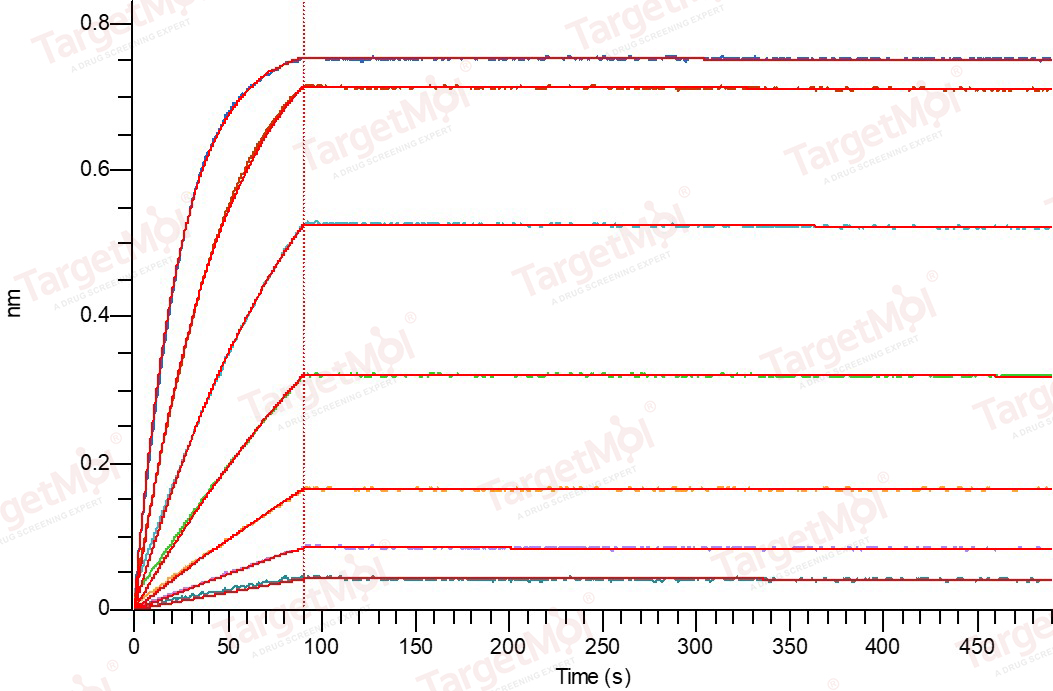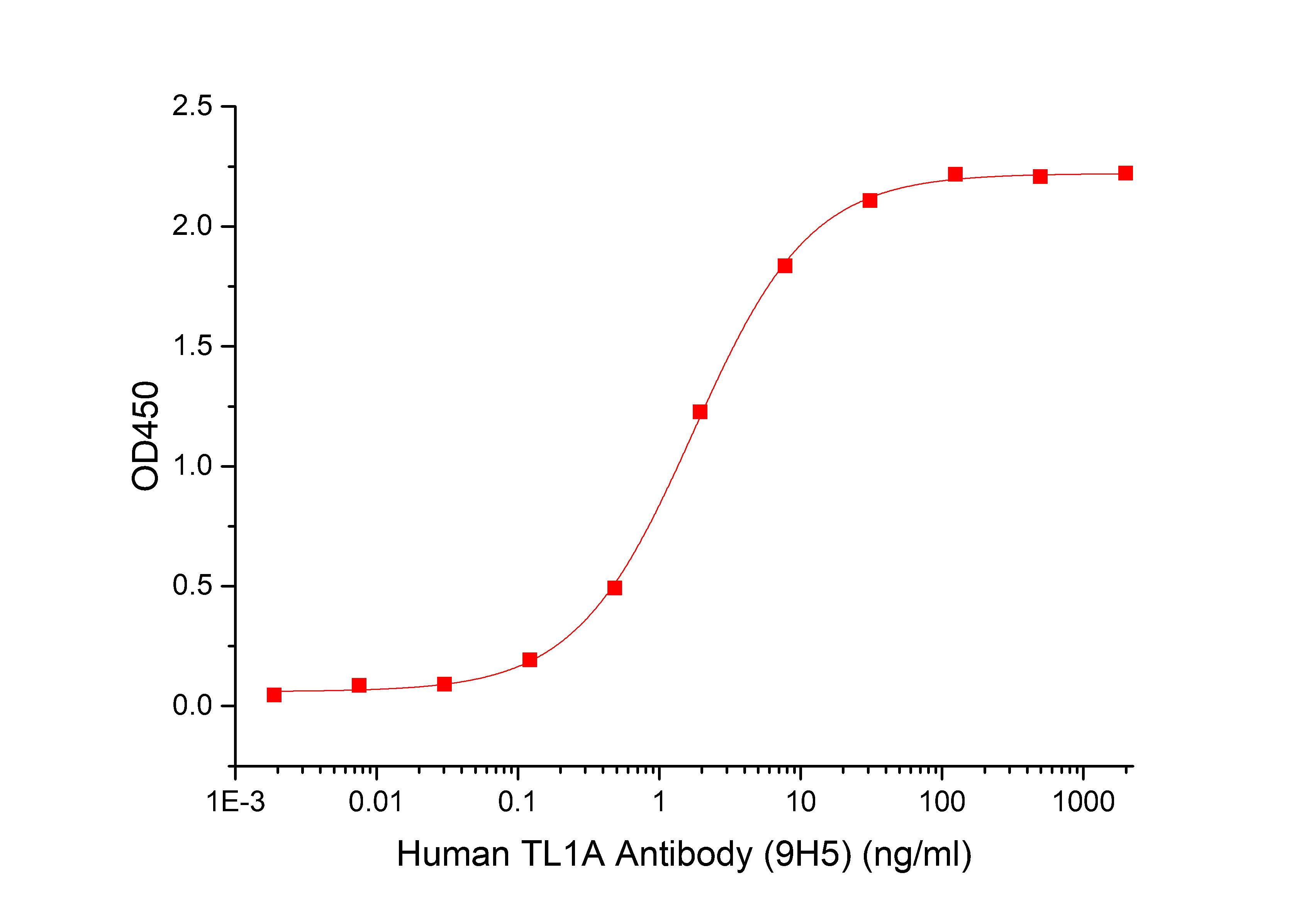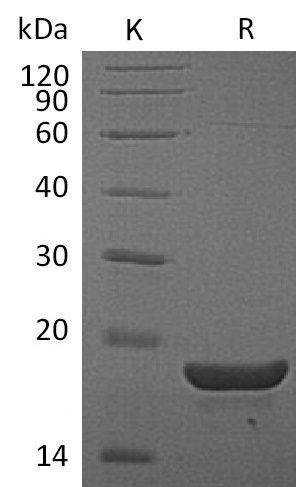- Remove All
 Your shopping cart is currently empty
Your shopping cart is currently empty
TL1A/TNFSF15 Protein, Mouse, Recombinant
Tumor Necrosis Factor Ligand Superfamily Member 15 (TNFSF15) is a new member of the tumor necrosis factor family. TNFSF15 is predominantly an endothelial cell-specific gene, and recombinant TNFSF15 is a potent inhibitor of endothelial cell proliferation, angiogenesis and tumor growth. TNFSF15 exerts two activities on endothelial cells: early G1 arrest of G0/G1-cells responding to growth stimuli and programmed cell death of proliferating cells. These activities are highly specific to endothelial cells. TNFSF15 is also able to regulate the expression of several important genes involved in angiogenesis. These findings are consistent with the view that TNFSF15 functions as an autocrine cytokine to inhibit angiogenesis and stabilize the vasculature.

TL1A/TNFSF15 Protein, Mouse, Recombinant
| Pack Size | Price | Availability | Quantity |
|---|---|---|---|
| 10 μg | $118 | In Stock | |
| 50 μg | $350 | 7-10 days | |
| 500 μg | $1,330 | 7-10 days | |
| 1 mg | $2,970 | 7-10 days |
Product Information
| Biological Activity | 1. Loaded TL1A Antibody-Fc on Protein A Biosensor, can bind Mouse TL1A-None with an affinity constant of 12.8 pM as determined in BLI assay. (Regularly tested)
2. Immobilized Recombinant Mouse TL1A at 2μg/ml (100 μl/well) can bind Human TL1A Antibody (9H5). The ED50 of Human TL1A Antibody (9H5) is 1.73 ng/ml. (Regularly tested)   |
| Description | Tumor Necrosis Factor Ligand Superfamily Member 15 (TNFSF15) is a new member of the tumor necrosis factor family. TNFSF15 is predominantly an endothelial cell-specific gene, and recombinant TNFSF15 is a potent inhibitor of endothelial cell proliferation, angiogenesis and tumor growth. TNFSF15 exerts two activities on endothelial cells: early G1 arrest of G0/G1-cells responding to growth stimuli and programmed cell death of proliferating cells. These activities are highly specific to endothelial cells. TNFSF15 is also able to regulate the expression of several important genes involved in angiogenesis. These findings are consistent with the view that TNFSF15 functions as an autocrine cytokine to inhibit angiogenesis and stabilize the vasculature. |
| Species | Mouse |
| Expression System | E. coli |
| Tag | Tag Free |
| Accession Number | AAV33431.1 |
| Synonyms | VEGI,Vascular Endothelial Cell Growth Inhibitor,Tumor Necrosis Factor Ligand Superfamily Member 15,TNFSF15,TNF Ligand-Related Molecule 1,TL1 |
| Amino Acid | Ile76-Leu252 |
| Construction | Ile76-Leu252 |
| Protein Purity | Greater than 95% as determined by reducing SDS-PAGE. (QC verified)  |
| Molecular Weight | 19 KDa (reducing condition) |
| Endotoxin | < 0.1 ng/µg (1 EU/µg) as determined by LAL test. |
| Formulation | Lyophilized from a solution filtered through a 0.22 μm filter, containing 20 mM PB, 300 mM NaCl, pH 7.0. |
| Reconstitution | Reconstitute the lyophilized protein in distilled water. The product concentration should not be less than 100 μg/ml. Before opening, centrifuge the tube to collect powder at the bottom. After adding the reconstitution buffer, avoid vortexing or pipetting for mixing. |
| Stability & Storage | Lyophilized powders can be stably stored for over 12 months, while liquid products can be stored for 6-12 months at -80°C. For reconstituted protein solutions, the solution can be stored at -20°C to -80°C for at least 3 months. Please avoid multiple freeze-thaw cycles and store products in aliquots. |
| Shipping | In general, Lyophilized powders are shipping with blue ice. Solutions are shipping with dry ice. |
| Research Background | Tumor Necrosis Factor Ligand Superfamily Member 15 (TNFSF15) is a new member of the tumor necrosis factor family. TNFSF15 is predominantly an endothelial cell-specific gene, and recombinant TNFSF15 is a potent inhibitor of endothelial cell proliferation, angiogenesis and tumor growth. TNFSF15 exerts two activities on endothelial cells: early G1 arrest of G0/G1-cells responding to growth stimuli and programmed cell death of proliferating cells. These activities are highly specific to endothelial cells. TNFSF15 is also able to regulate the expression of several important genes involved in angiogenesis. These findings are consistent with the view that TNFSF15 functions as an autocrine cytokine to inhibit angiogenesis and stabilize the vasculature. |
Dose Conversion
Calculator
Tech Support

Copyright © 2015-2025 TargetMol Chemicals Inc. All Rights Reserved.


